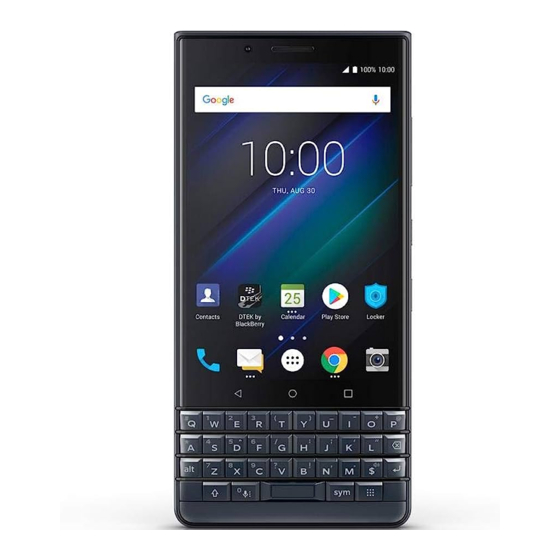Blackberry KEY2 LE Güvenlik ve Ürün Bilgileri - Sayfa 3
Cep Telefonu Blackberry KEY2 LE için çevrimiçi göz atın veya pdf Güvenlik ve Ürün Bilgileri indirin. Blackberry KEY2 LE 9 sayfaları.
Ayrıca Blackberry KEY2 LE için: Hızlı Başlangıç Kılavuzu (32 sayfalar)

Approved charging accessory models
Charging cables: CDA0000113CF, CDA0000119CF, CDA0000119C1
AC chargers: CBA0064AGBC1, CBA0064AABC1, CBA0064ABBC1, CBA0064AKBC1,
CBA0064ACBC1, CBA0064AHBC1
Use the charging accessories provided with the smartphone or any other manufacturer
approved charging accessories only from the type of power source indicated on the marking
label. Before you use any power supply, verify that the mains voltage is in accordance with the
voltage printed on the power supply.
Do not overload power outlets, extension cords, or convenience receptacles because this
might result in a risk of fire or electric shock. To reduce the risk of damage to the cord or the
plug, pull the plug rather than the cord when you disconnect the charging accessory from the
power outlet or convenience receptacle.
Protect the power cord from being walked on or pinched, particularly at convenience
receptacles and the point where the power cord connects to the smartphone. Always route
the power cord in a way that reduces the risk of injury to others, such as tripping or choking.
Unplug charging accessories during lightning storms or when not being used. Do not use
charging accessories outside or in any area exposed to the elements.
For more information about connecting the power supply, see the documentation that came
with your smartphone.
To buy accessories for your smartphone, contact your wireless service provider.
Battery safety
Your smartphone contains a nonremovable lithium-ion battery. Do not attempt to remove the
battery. Removing the battery will void the Limited Warranty for your smartphone and could
cause damage to the battery.
The battery might present a fire, explosion, chemical burn, or other hazard if mistreated.
Do not put your battery in contact with liquids. Do not heat the battery above 140°F (60°C).
Heating the battery above 140°F (60°C) could cause the battery to catch fire or explode.
Do not expose the smartphone and its battery to fire or other external heat
sources, such as hot plates, stove tops, space heaters, or ovens, because
this could cause fire or explosion.
Do not attempt to insert foreign objects into the battery. Do not
remanufacture, disassemble, modify, crush, puncture, bend, or shred the
battery. If the battery has been remanufactured, disassembled, modified,
crushed, punctured, or altered in any other way, cease use of the battery
immediately.
Do not short-circuit the battery or allow metallic or conductive objects to
contact the battery terminals.
CAUTION: Do not attempt to remove the battery. Use of any other batteries might present
a risk of fire, explosion, battery leakage, or other hazard. Please ensure you dispose of used
batteries according to the instructions set out in this document.
When this icon appears on your smartphone, there may be a problem with
the battery or the battery connection. Try restarting your smartphone.
If the icon still appears, return your smartphone to qualified service
personnel for repair.
Driving and walking safely
Do not use your smartphone while you drive. Give your full attention to driving; driving safely is
your first responsibility. You are responsible for knowing and obeying the laws and regulations
regarding the use of wireless devices in the areas where you drive.
Store your smartphone safely before driving your vehicle. If your vehicle is equipped with an
air bag, do not place your smartphone or any accessories above the air bag, or in the air bag
deployment area. If the air bag inflates, serious injury could result.
Radio frequency signals might affect improperly installed or inadequately shielded electronic
systems in motor vehicles. Check with the vehicle manufacturer or its representative. If any
equipment has been added to your vehicle, you should also consult the manufacturer of that
equipment for information on radio frequency signals.
3
